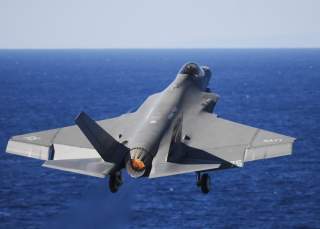Does America Really Need to Spend More on Defense?
America can’t buy perfect security.
Conclusion
This analysis shows that the United States spends more now, in real terms, on defense and defense-related activities and obligations than at any time since World War II. This spending is absent threats that can be completely resolved militarily. The United States is not likely go to war with Russia or China in the near future; North Korea will not be deterred by more military exercises or an enhanced presence; Iran is not likely to attack Israel or any other U.S. regional ally; global terror networks may be hammered by U.S. munitions but the reasons for their existence will not go away no matter how much more force is applied. Meanwhile, as we first pointed out in 2010, adding more money to the defense budget takes funds away from other important budgetary areas, such as infrastructure, education, jobs programs and clean energy.
The United States has a security dilemma: It has built a global network of alliances and committed to a permanent worldwide military presence to which dozens of countries look for security assurance. Eleven presidents have each in their own way tried to build upon the post-World War II liberal order, creating or fostering democracy where possible, building international institutions and underwriting the security of hundreds of millions of people. This has been in the nation’s interest, and served to produce a durable peace among many former enemies based on liberal democracy and free trade. These obligations have come at a cost, however, and because of the primacy of U.S. power and the seeming inevitably of the U.S.-backed world order, policymakers have failed to reckon with what those costs entail. This is not to say that the United States should abandon allies or withdraw from the world, but U.S. strategy must come to terms with the constraints imposed by trends and events outside of its control.
The Cold War is past. The era of “unipolarity,” if it ever truly existed, is gone. The United States must adapt and determine how best to uphold the work of the past seventy years and improve upon what exists while countering nontraditional approaches that undermine the order it helped build. Hardening U.S. and allied information systems against cyberattacks, building redundancy and flexibility into critical infrastructure, such as satellite communications and national power grids and researching the impact of information warfare—whether conducted by China or the Islamic State—should all be pursued. Building a manned joint strike fighter in the drone era that will cost a trillion dollars over its lifecycle or spending another trillion to modernize a Cold War nuclear force should not.
Tanks and nuclear bombs have very little use in the modern world, and the chance of a conventional war with any near-peer is extremely unlikely. Hostile or unfriendly nations seek to counter traditional U.S. dominance in areas of traditional strength by finding cheap and effective asymmetric means, which the defense budget rightly addresses, at least to some extent. The bulk of the money, however, is being spent in domains where DOD feels most comfortable and where political support exists.
Simply put, the United States cannot buy perfect security. No amount of money will ever be capable of banishing fear, no matter how unmoored from reality or probability it might be. The United States requires leadership that can see the world for what it is and must not fall into the rut of consensus that favors the status quo and entrenched interests over facing the ambiguity of a changing world. The United States needs a strategy that recognizes the constraints and limits of its power, develops options outside of airstrikes and boots on the ground and utilizes tools that have the best chance to achieve a desired outcome. The current global trends make it apparent that the utility of the military to solve problems is limited. The time has come for Washington to come to grips with that fact and apply some of its famed American ingenuity to these seemingly intractable problems. If the liberal order—which brought peace in Europe and turned enemies into allies—is worth preserving, then it must be safeguarded by an engaged public and clear-eyed and dynamic representatives not by spending more money on defense.
Lawrence J. Korb is a Senior Fellow at American Progress. He is an adjunct professor at Georgetown University. Prior to joining American Progress, he was vice president, director of studies and holder of the Maurice Greenberg Chair at the Council on Foreign Relations. From 1981 to 1985, he was assistant secretary of defense. Eric M. Goepel is a veteran of both the Iraq and Afghanistan campaigns and is currently a HillVets fellow. He is a graduate of the University of California at Berkeley, with a major in political science. He is also a U.S. Army veteran with seven years of experience in the fields of communications and intelligence.
Image: F-35 in flight. Pixabay/Public domain.

